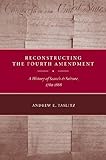Reconstructing the Fourth Amendment : A History of Search and Seizure, 1789-1868 / Andrew E. Taslitz.
Material type: TextPublisher: New York, NY : New York University Press, [2006]Copyright date: ©2006Description: 1 online resourceContent type:
TextPublisher: New York, NY : New York University Press, [2006]Copyright date: ©2006Description: 1 online resourceContent type: - 9780814782637
- 9780814784211
- 345.73052209
- KF9630 .T37 2006
- online - DeGruyter
| Item type | Current library | Call number | URL | Status | Notes | Barcode | |
|---|---|---|---|---|---|---|---|
 eBook
eBook
|
Biblioteca "Angelicum" Pont. Univ. S.Tommaso d'Aquino Nuvola online | online - DeGruyter (Browse shelf(Opens below)) | Online access | Not for loan (Accesso limitato) | Accesso per gli utenti autorizzati / Access for authorized users | (dgr)9780814784211 |
Browsing Biblioteca "Angelicum" Pont. Univ. S.Tommaso d'Aquino shelves, Shelving location: Nuvola online Close shelf browser (Hides shelf browser)

|

|

|

|

|

|

|
||
| online - DeGruyter Satisfaction Not Guaranteed : Dilemmas of Progress in Modern Society / | online - DeGruyter Contagious Representation : Women's Political Representation in Democracies around the World / | online - DeGruyter Rebel Girls : Youth Activism and Social Change Across the Americas / | online - DeGruyter Reconstructing the Fourth Amendment : A History of Search and Seizure, 1789-1868 / | online - DeGruyter Releasing Prisoners, Redeeming Communities : Reentry, Race, and Politics / | online - DeGruyter Shi'ism in America / | online - DeGruyter Feminist Legal History : Essays on Women and Law / |
restricted access online access with authorization star
http://purl.org/coar/access_right/c_16ec
The modern law of search and seizure permits warrantless searches that ruin the citizenry's trust in law enforcement, harms minorities, and embraces an individualistic notion of the rights that it protects, ignoring essential roles that properly-conceived protections of privacy, mobility, and property play in uniting Americans. Many believe the Fourth Amendment is a poor bulwark against state tyrannies, particularly during the War on Terror. Historical amnesia has obscured the Fourth Amendment's positive aspects, and Andrew E. Taslitz rescues its forgotten history in Reconstructing the Fourth Amendment, which includes two novel arguments. First, that the original Fourth Amendment of 1791-born in political struggle between the English and the colonists-served important political functions, particularly in regulating expressive political violence. Second, that the Amendment's meaning changed when the Fourteenth Amendment was created to give teeth to outlawing slavery, and its focus shifted from primary emphasis on individualistic privacy notions as central to a white democratic polis to enhanced protections for group privacy, individual mobility, and property in a multi-racial republic.With an understanding of the historical roots of the Fourth Amendment, suggests Taslitz, we can upend negative assumptions of modern search and seizure law, and create new institutional approaches that give political voice to citizens and safeguard against unnecessary humiliation and dehumanization at the hands of the police.
Mode of access: Internet via World Wide Web.
In English.
Description based on online resource; title from PDF title page (publisher's Web site, viewed 01. Nov 2023)


